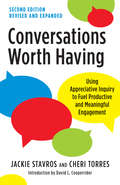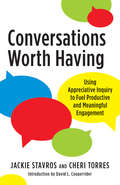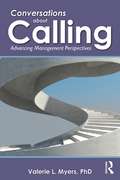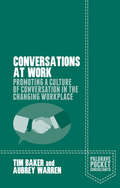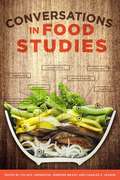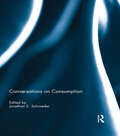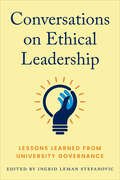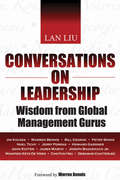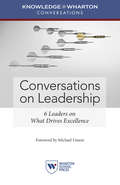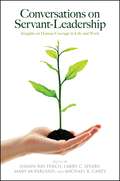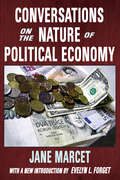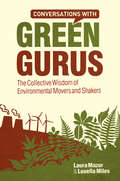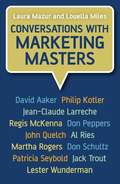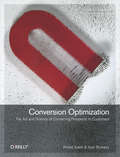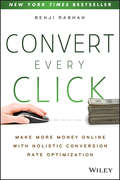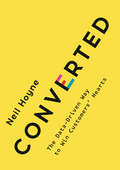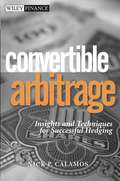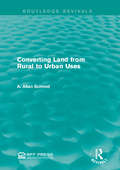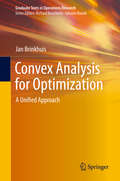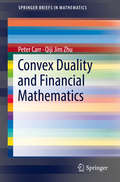- Table View
- List View
Conversations Worth Having, Second Edition: Using Appreciative Inquiry to Fuel Productive and Meaningful Engagement
by Jackie Stavros Cheri TorresNow in a second edition, this classic book shows how to make conversations generative and productive rather than critical and destructive so people, organizations, and communities flourish. We know that conversations influence us, but we rarely stop to think about how much impact they have on our well-being and ability to thrive. This book is the first to show how Appreciative Inquiry—a widely used change method that focuses on identifying what's working and building on it rather than just trying to fix what's broken—can help us communicate more effectively and flourish in all areas of our lives.By focusing on what we want to happen instead of what we want to avoid and asking questions to deepen understanding and increase possibilities, we expand creativity, improve productivity, and unleash potential at work and home. Jackie Stavros and Cheri Torres use real-life examples to illustrate how these two practices and the principles that underlie them foster connection, innovation, and success.This edition has been revised throughout with new examples; updates on the latest supporting research in neuroscience, positive science, and positive psychology; and a discussion guide. It also features a new chapter on what the authors call tuning in: cultivating awareness of how our physical and mental state affect our perceptions, emotions, and thoughts as we engage in conversation. This book teaches you how to use the practices and principles of Appreciative Inquiry to strengthen relationships, build effective teams, and generate possibilities for a future that works for everyone.
Conversations Worth Having: Using Appreciative Inquiry to Fuel Productive and Meaningful Engagement
by David L. Cooperrider Jacqueline M. Stavros Cheri TorresA Unique Guide to Changing Our World of Conversation. Conversation is a crucial part of everything we do. It influences our well being—a good conversation can leave us ready for anything, a bad one can ruin our whole day. But most of us are unaware of the nature of our conversations, let alone how to make them consistently affirming and empowering. This book shows us how to use Appreciative Inquiry, one of the most effective and widely used approaches for fostering positive change, to dramatically improve the outcomes of our conversations. By focusing on what we want to happen instead of what we want to avoid, and asking questions to deepen understanding and increase possibilities, we expand creativity, improve productivity, and unleash potential, at work and home. “This book is for everyone, from managers striving to lead more effectively, to parents trying to cultivate better conversations with children.”Lindsey Godwin, Director, David L. Cooperrider Center for Appreciative Inquiry“Wow! What a great book! I'm going to use it in my courses and with every client. It is rare to read a book that is so compelling and practical with simple guidelines anyone can use.”Gervase R. Bushe, Professor, Simon Fraser University, and author of Clear Leadership “A conversation is the smallest visible unit of change, our starting point for every important change effort. This book is a gift to the world, business, schools, and families!”Jon Berghoff, President, Flourishing Leadership Institute“A must read for all leaders. Practical wisdom and relatable stories!”Robert Easton, Senior Managing Director, Accenture“This short book is a rare gem—entertaining, relevant, educational, and immensely practical.!”Maureen McKenna, Founder, Return on EnergyJackie Stavros and Cheri Torres have been internationally recognized for their work with Appreciative Inquiry. They've positively affected the lives of thousands of people and helped hundreds of organizations improve their capacity to thrive in uncertain times. They have been researching, writing, consulting, and speaking on Appreciative Inquiry since 1996.
Conversations about Calling: Advancing Management Perspectives
by Valerie L. MyersConversations about Calling explores management perspectives of the calling construct. Using Max Weber’s seminal work, The Protestant Ethic and the Spirit of Capitalism, as a starting point, Myers seeks to enrich management perspectives of calling by integrating the contributions of other disciplines to the literature on calling. While the word 'calling' is casually used as shorthand for 'my ideal job', the calling concept has provoked deeper and varied interest among the secular and spiritual circles of both scholars and practitioners. Structured around the idea of four conversations, the book aims to promote a holistic examination of calling. Each conversation has a different focus, elucidating important dimensions of calling, and together they provide a truly comprehensive view. Part I of the book examines existing conversations in management, while part II explores calling across disciplines and eras, from the 1500s to the present. Finally, part III unifies all conversations in a comprehensive theory, then discusses its application and implications for practitioners and organizations. With a strong theoretical grounding, the book also incorporates practical applications supported by case studies. Anyone interested in ethics or management and spirituality will benefit from reading this book. Please visit www.conversationsaboutcalling.com to rate the book and write a review.
Conversations at Work: Promoting a Culture of Conversation in the Changing Workplace (Palgrave Pocket Consultants)
by Tim Baker Aubrey WarrenOrganizations are about conversations. For any organization to achieve its goals, people need to interact and those interactions require dialogue and conversation. Yet, thanks to technology, we seem to be having fewer genuine conversations. This book seeks to change this, through "how to skills" and wider cultural change advice.
Conversations in Food Studies
by Arthur Green Carmen Wong Penny Van Esterik Keith Lee Jennifer Sumner Charles Z. Levkoe Phil Mount Colin R. Anderson Jennifer Brady Mustafa Koç Mary A. Beckie Eva A. Bogdan Mark Bomford Jennifer A. Braun Samara Brock Robyn Bunn Kirsten Valentine Cadieux Chantal Clement Anais Detolle Ankit Gupta Robert Jennings Josee Johnson Emily Huddart Kennedy Ahmed Khan Mustafa Koc Kristen Lowitt Wanda Martin Victoria Millious Erika Mundel Alan Nash Seriy Polyakov Keren Rideout Steffanie Scott Tammara Soma Cathryn Sprague David Szanto Lani Trenouth Matt Ventresca Cassie Wever Konstantinos ZougrisFew things are as important as the food we eat. "Conversations in Food Studies" demonstrates the value of interdisciplinary research through the cross-pollination of disciplinary, epistemological, and methodological perspectives. Widely diverse essays, ranging from the meaning of milk, to the bring-your-own-wine movement, to urban household waste, are the product of collaborating teams of interdisciplinary authors. Readers are invited to engage and reflect on the theories and practices underlying some of the most important issues facing the emerging field of foodstudies today. Conversations in Food Studies brings to the table thirteen original contributions organized around the themes of representation, governance, disciplinary boundaries, and, finally, learning through food. This collection offers an important and groundbreaking approach to food studies as it examines and reworks the boundaries that have traditionally structured the academy and that underlie much of food studies literature.
Conversations on Consumption
by Jonathan E. SchroederConsumption studies has grown tremendously in the past decade. Researchers in sociology, geography, anthropology, history, marketing, management, organization and even art history have embraced consumption as a key institution of our era, and are eager for ideas and insights. Conversations on Consumption makes an important contribution to the growing field of consumption studies by offering readers a lively introduction to debates and dialogues that have shaped the field, in the form of engaging interviews and personal reflections from leading theorists and researchers.The interviews in this collection were first published in the interdisciplinary journal Consumption Markets and Culture and together form an accessible summary of the leading ideas and key developments in consumption studies and social theory over the past two decades. With innovative contributions from marketing academics, historians, consumer researchers, sociologists, anthropologists and artists, the pieces highlight the interdisciplinary nature of consumption, as well as the wide-ranging interest in consumption studies. They are united in their approach to understand consumption, far removed from economic or managerial analysis, by focusing more on the role it plays in culture.Conversations on Consumption will be of interest to scholars and students of sociology, anthropology, consumer research, management studies, and history.
Conversations on Ethical Leadership: Lessons Learned from University Governance (UTP Insights)
by Ingrid Leman StefanovicHighlighting ethical leadership strategies, Conversations on Ethical Leadership explores what makes for strong, well-informed, morally sound decision-making at all levels of an organization. In addressing a range of challenges faced by universities and applying those lessons to the broader community of the public and private sectors, Ingrid Leman Stefanovic and her contributors tackle a host of issues related to advancing ethics, diversity, inclusiveness, and the art of moral leadership. Each chapter, written by an author with roots in the academy, includes a subsequent commentary by a community leader who highlights the broader takeaways that emerge for society from the university experience. In this way, the book becomes a conversation between the academic and non-academic worlds about issues that affect any prominent organization. It offers a unique range of novel and timely topics, from responsibility-centred budgeting to post-pandemic planning, responsiveness to climate change, Indigenous leadership, free speech, academic integrity, and much more. In doing so, Conversations on Ethical Leadership ultimately reveals how we can build and preserve an ethically responsible sense of purpose at our post-secondary learning institutions and beyond.
Conversations on Leadership
by Lan LiuA veritable who's who in leadership, Conversations on Leadership features Warren Bennis, Jim Kouzes, John Kotter, Noel Tichy, Peter Senge, James March, Howard Gardner, Bill George, and others. Since each leader has a distinctive approach, this book provides the multi-faceted truths of leadership to broaden and deepen the understanding of the readers.
Conversations on Leadership: 6 Leaders on What Drives Excellence (Knowledge@Wharton Conversations)
by Knowledge WhartonWhat if you could sit down with some of today’s most effective business leaders? Now you can. Knowledge@Wharton has interviewed some of today’s most powerful and successful business leaders about issues important to them as leaders.
Conversations on Servant-Leadership: Insights on Human Courage in Life and Work
by Shann Ray Ferch; Larry C. Spears; Mary McFarland; Michael R. CareyIn a world where organizations and leaders face conflicts and complexity at an alarming rate, where human cruelty sometimes dominates kindness in individuals and families, and where nations hover in the shadow of moral and financial collapse, how do we find courage to forge a strong and enduring path into the future? In this book, fourteen of the world's foremost thought leaders consider the role of leadership, love, and power in the midst of political and social upheaval. Included are interviews with former president of the Philippines Corazon Aquino; servant-leaders Margaret Wheatley, Ken Blanchard, George Zimmer, and James Autry; and others. They engage the significant leadership questions of our time and reveal an uncommon and life-affirming path toward families, organizations, and nations imbued with generosity and meaning.
Conversations on Social Choice and Welfare Theory - Vol. 1 (Studies in Choice and Welfare)
by Marc Fleurbaey Maurice SallesThis volume presents interviews that have been conducted from the 1980s to the present with important scholars of social choice and welfare theory. Starting with a brief history of social choice and welfare theory written by the book editors, it features 15 conversations with four Nobel Laureates and other key scholars in the discipline. The volume is divided into two parts. The first part presents four conversations with the founding fathers of modern social choice and welfare theory: Kenneth Arrow, John Harsanyi, Paul Samuelson, and Amartya Sen. The second part includes conversations with scholars who made important contributions to the discipline from the early 1970s onwards. This book will appeal to anyone interested in the history of economics, and the history of social choice and welfare theory in particular.
Conversations on the Nature of Political Economy
by Jane MarcetJane Marcet is not writing for the working classes, but for women and men of the educated classes of the nineteenth century. She draws her principles and materials from the writings of the great masters who have written about political economy, particularly Adam Smith, Th omas Robert Malthus, Jean-Baptise Say, Jean Charles Luonard de Sismondi, and David Ricardo.Marcet consolidates the ideas of bankers as well as professional political economists. She makes their ideas accessible, not only to the young people she identifi es as her audience in the book's preface, but also to the middle classes--political actors and business people. She challenges the English classical school to take seriously the ideas of continental economists by inserting those ideas into a popular book.Marcet maintains distance from some of the central tenets of classical economics, but engages in conversation with its masters. Sometimes she accepts criticism of their ideas, but at other times she keeps her own counsel. The ideas of the masters will be immediately identifi able to those for whom political economy is not new, although a few of their more abstruse questions and controversies have been omitted. When the soundness of a doctrine appears well established, Marcet presents it conscientiously. Evelyn L. Forget's well written introduction describes the life and background of the author as well as the book's history, bringing this timeless classic into the twenty- first century.
Conversations with Frank Gehry
by Barbara IsenbergAn unprecedented, intimate, and richly illustrated portrait of Frank Gehry, one of the world's most influential architects. Drawing on the most candid, revealing, and entertaining conversations she has had with Gehry over the last twenty years, Barbara Isenberg provides new and fascinating insights into the man and his work.Gehry's subjects range from his childhood--when he first built cities with wooden blocks on the floor of his grandmother's kitchen--to his relationships with clients and his definition of a "great" client. We learn about his architectural influences (including Le Corbusier and Frank Lloyd Wright) and what he has learned from Michelangelo, Rembrandt, and Rauschenberg.We explore the thinking behind his designs for the Guggenheim Bilbao and the Walt Disney Concert Hall, the redevelopment of Atlantic Yards in Brooklyn and Grand Avenue in Los Angeles, the Gehry Collection at Tiffany's, and ongoing projects in Toronto, Paris, Abu Dhabi, and elsewhere. And we follow as Gehry illuminates the creative process by which his ideas first take shape--for example, through early drawings for the Guggenheim Museum in Bilbao, when the building's trademark undulating curves were mere scribbles on a page. Sketches, models, and computer images provided by Gehry himself allow us to see how so many of his landmark buildings have come to fruition, step by step.Conversations with Frank Gehry is essential reading for everyone interested in the art and craft of architecture, and for everyone fascinated by the most iconic buildings of our time, as well as the man and the mind behind them.From the Hardcover edition.
Conversations with Green Gurus
by Laura Miles Louella MazurThe collected wisdom of some of the world's most influential environmental movers and shakers is brought together in this one book. The chosen gurus consists both of "thinkers" - those who have set the agenda, and of "doers" - those business people who made the green cause their mission long before it became so prominent. The book covers a broad range of environmental issues as they apply to business, including the economic viability of choosing green routes. Interviewees include energy guru Amory Lovins, former Friends of the Earth Vice Chair Tony Juniper, diplomat Sir Crispin Tickell and business leader Ray Anderson, among others. The cutting edge thinking of the book's contributors provides businesses with the information they need when considering how to change in a green direction. The end result is an illuminating insight into both general views on sustainability as well as good and bad business decisions made in the search for sustainability. The full list of green gurus include: Ray Anderson, founder and chairman of Interface Inc, one of TIME Magazine's 'Heroes of the Environment' James Cameron, founder of Executive Director and Vice-Chairman of Climate Change Capital (CCC) Paul Dickinson, CEO of the Carbon Disclosure Project John Elkington, founding partner and director of Volans, co-founder of SustainAbility, world authority of sustainable development, author of The Green Consumer Guide John Grant, author of The Green Marketing Manifesto, frequent conference speaker and prolific blogger Denis Hayes, President and CEO of The Bullitt Foundation, Chair of the International Earth Day Network Gary Hirshberg, President and Chief Executive Officer of Stonyfield Farm, the world's largest producer of organic yogurt Tony Juniper, former Executive Director of Friends of the Earth (FoE), environmental campaigner, author and commentator Professor Sir David King, Director of the Smith School of Enterprise and the Environment at the University of Oxford Amory B. Lovins, environmentalist, Chairman and Chief Scientist of Rocky Mountain Institute Professor Wangari Maathai, environmental and political activist, Nobel Peace Prize Winner Ricardo Navarro, founder and director of the Salvadoran Centre for Appropriate Technology (CESTA), winner of the prestigious Goldman prize Dr Vandana Shiva, physicist, environmental activist and author Jeffrey Swartz , CEO of Timberland Worldwide Sir Crispin Tickell, diplomat, academic, environmentalist, author
Conversations with Marketing Masters
by Laura Miles Louella MazurConversations with Marketing Masters offers new insights by gathering the collected wisdom of the most influential marketing thinkers of our age, each of whom has given a structured interview. Covering a wide range of issues and illustrating concepts with cases of success and failure, these seminal dialogues offer a rare look at what made each master great - and a glimpse of the marketing future. The Marketing Masters featured are Philip Kotler, David Aaker, Jean-Claude Larreche, Regis McKenna, Don Peppers, John Quelch, Al Ries, Martha Rogers, Don Schultz, Patricia Seybold, Jack Trout and Lester Wunderman. The conversations are free-flowing dialogues in which each personality is allowed to shine through.
Conversion Optimization: The Art and Science of Converting Prospects to Customers
by Khalid Saleh Ayat ShukairyHow do you turn website visitors into customers?Conversion Optimization offers practical advice on how to persuade visitors to make a buying decision -- without driving them away through data overload or tedious navigation. You'll learn how to use marketing principles, design, usability, and analytics on your site to increase your buyer-to-visitor ratio, whether you're involved with marketing or designing a large ecommerce site, or managing a modest online operation.Based on the authors' broad experience in helping businesses attract online customers, this book addresses every aspect of the process, from landing visitors to finalizing the sale. You'll learn several techniques for blending successful sales approaches with the particular needs of the people you want to attract. Are you ready to do what it takes to get a double-digit conversion rate?Explore case studies involving significant conversion rate improvementsWalk through different stages of a sale and understand the value of eachUnderstand your website visitors through persona creationConnect with potential customers and guide them toward a conversionLearn how to deal with FUDs -- customer fears, uncertainties, and doubtsExamine the path that visitors take from landing page to checkoutTest any change you make against your original design"The Web is unique in its ability to deliver this almost improbable win-win: You can increase revenue AND make your customers happy. Yet most websites stink. Worry not, Khalid and Ayat to the rescue! Buy this book to follow their practical advice on how to create high converting websites that your visitors love."--Avinash Kaushik, author of Web Analytics 2.0 and Web Analytics: An Hour A Day (both Sybex)
Conversion-Optimierung: Über 150 Praxistipps zu datengetriebenem Marketing, Analytics & Webseitenoptimierung
by Tobias LooscheldersDieses Buch ist ein praxiserprobter Guide, mit dem Sie Ihre Marketing-Kampagnen, Landingpages und Websites systematisch optimieren können. Zugleich ist es ein perfekter Leitfaden für den Einstieg in ein datengetriebenes Marketing. Es richtet sich an Berufseinsteiger im professionellen Online-Marketing und Marketers mit einigen Jahren Erfahrung, die nun den nächsten Schritt tun wollen.Über die Conversion-Optimierung werden Online-Kampagnen und Webseiten erfolgreicher gemacht – zudem lernt man viel über seine Kund:innen. Die Grundlage dafür sind Daten. Diese bilden das Fundament für effektive Maßnahmen wie A/B-Testing, Personalisierung und letztlich mehr Umsatz. Wer die dafür notwendigen Tools, Prozesse und KPIs beherrscht, erzielt bessere Ergebnisse und schafft entscheidende Wettbewerbsvorteile für das eigene Unternehmen.Das Buch ist gespickt mit handfesten Tipps für Marketers, die konsequent Ihr Online-Marketing mit einem datengetriebenen Ansatz nach vorne bringen wollen. Konkrete Modelle und Vorgehensweisen schaffen dafür Sicherheit und Durchblick. Tobias Looschelders erklärt u.a., wie die Optimierung von Webseiten mit dem 6-stufigen RETURN-Modell funktioniert, die Priorisierung von A/B-Tests mit dem SCORE-Framework verbessert wird oder Digital-Marketing-Maßnahmen optimiert werden können.Aus dem InhaltConversion Rates optimieren und mit effizienterem Marketing Geld sparenErfolgreiche Webseitenoptimierung: Best Practices mit dem RETURN-ModellA/B-Testing: mit Experimenten Webseiten systematisch optimierenErfolgreiche Optimierung und A/B-Testing von DigitalkampagnenIndividualisierte Webseiten und personalisiertes MarketingDie Geheimnisse funktionierender Conversion-OptimierungMit Gastbeiträgen von Philipp Mantel (case study air up GmbH) und Benjamin Uhlmann (case study Reishunger GmbH)Was Sie aus den einzelnen Kapitel mitnehmen werden:Aus Kapitel 1 „Conversion-Optimierung als Motor des Online-Erfolg“Was Conversions sind und weshalb die Conversion Rate ein so wichtiger Optimierungshebel ist.Wie sich die relevantesten Ansprüche und Bedürfnisse von Web-User:innen aktuell darstellen.Warum es so wichtig ist, über die verschiedenen Nutzergruppen Ihrer Webseite nachzudenken.Welche die wichtigsten Werkzeuge der Conversion-Optimierung sind.Wie Sie gute Optimierungsideen entwickeln.Einen konkreten 10-Schritte-Plan für die Implementierung datengetriebenen Marketings in Ihrem Unternehmen.Aus Kapitel 2 „Erfolgreiche Webseitenoptimierung“Die sechs wichtigsten Kategorien der Webseitenoptimierung.Worauf Sie achten sollten um Erstbesucher:innen Ihrer Webseite in den wichtigen ersten Sekunden für sich zu gewinnenMaßnahmen zur Steigerung der Interaktion mit Ihrer Webseite.Wie Sie die Benutzerfreundlichkeit von Webseiten erhöhen und Hürden für die Nutzer:innen abbauen.Wie Sie über Ihre Webseite klar und zielführend kommunizieren und erfolgreich argumentieren.Diverse Impulse, wie Sie Ihre Internetpräsenzen vertrauensschaffender gestalten können.Aus Kapitel 3 „A/B-Testing“Was Sie alles A/B-testen können, um den Erfolg Ihrer Webseite zu verbessern.Praktische Tipps zum A/B-Testing von Webseiten und welche Stolpersteine es zu vermeiden gilt.Warum es so wichtig ist, Testlaufzeiten einzuhalten (auch wenn es schwerfällt).Mit welchem kostenfreien Tool Sie ins A/B-Testing einsteigen können.Welche Kennzahlen Sie benötigen und warum dazu keine theoretische Statistik nötig ist.Wie Sie erfolgreich Test-Hypothesen formulieren.Konkretes Handwerkzeug, um Ihre Testideen faktenbasiert priorisieren zu können.Aus Kapitel 4 „Erfolgreiche Optimierung und A/B-Test
Convert Every Click: Make More Money Online with Holistic Conversion Rate Optimization
by Benji RabhanA holistic approach to conversion rate optimization that encompasses an entire business--online and offline--to drive more sales and referrals, and increase bottom-line profits In order for your business to survive, you must convert anonymous traffic into sales. The better you do that, the more money you make. The science of tweaking and testing webpages to convert the maximum number of people is known as conversion rate optimization (CRO). Convert Every Click introduces an expanded vision of CRO that the author, Benji Rabhan, calls "holistic conversion rate optimization." Internet technology and innovation have changed the way you should be optimizing your business, your marketing, and your websites. The book looks at the psychology behind this new way of optimizing an entire business for more profits. It examines how your website plays a role in your overall business strategy, and details how to use CRO psychology and strategies to increase profits. Teaches proven strategies for increasing conversions across your entire business Details various split testing and data gathering methods and when to use each one Unveils a holistic approach to conversion rate optimization, using technology to create a more customer-centric experience that not only increases conversions, but also improves customer engagement and satisfaction With guidance from Convert Every Click, you'll learn how to boost conversions and consumption across your entire business by maximizing every bit of your hard-earned traffic before, during, and after a sale.
Converted: The Data-Driven Way to Win Customers' Hearts
by Neil HoyneWhen the world&’s biggest brands want to sharpen their digital marketing strategy, they call Neil Hoyne – Google&’s Chief Measurement Strategist and Senior Fellow at the Wharton School. In his first book, he offers a simple, research-backed playbook that anyone can use to find their best customers and develop relationships that last.Under pressure for quick results and facing fierce marketplace competition, too many marketers are boxed into spaghetti-to-the-wall forms of digital marketing that limit the potential of their long hours, countless experiments, and warehouses of data. And in the end, they watch their competition sprint ahead. But what if you built a business around long-term relationships with customers, using data to understand who they are, what they need, and where to find more customers just like them? You can. And you&’ll leave your competitors, with all of their data and their short-term thinking, to poke around in the scraps. In Converted, you will learn how to: • Understand the full value of each relationship • Engage in an ongoing conversation with your best customers • Ask the right questions so you can anticipate your customers&’ needs • Find more great customers A real person is always on the other end of the transaction. Converted shows you how to win their hearts.
Convertible Arbitrage
by Calamos Nick P.Minimize risk and maximize profits with convertible arbitrage Convertible arbitrage involves purchasing a portfolio of convertible securities-generally convertible bonds-and hedging a portion of the equity risk by selling short the underlying common stock. This increasingly popular strategy, which is especially useful during times of market volatility, allows individuals to increase their returns while decreasing their risks. Convertible Arbitrage offers a thorough explanation of this unique investment strategy. Filled with in-depth insights from an expert in the field, this comprehensive guide explores a wide range of convertible topics. Readers will be introduced to a variety of models for convertible analysis, "the Greeks," as well as the full range of hedges, including titled and leveraged hedges, as well as swaps, nontraditional hedges, and option hedging. They will also gain a firm understanding of alternative convertible structures, the use of foreign convertibles in hedging, risk management at the portfolio level, and trading and hedging risks. Convertible Arbitrage eliminates any confusion by clearly differentiating convertible arbitrage strategy from other hedging techniques such as long-short equity, merger and acquisition arbitrage, and fixed-income arbitrage. Nick Calamos (Naperville, IL) oversees research and portfolio management for Calamos Asset Management, Inc. Since 1983 his experience has centered on convertible securities investment. He received his undergraduate degree in economics from Southern Illinois University and an MS in finance from Northern Illinois University.
Convertible Notes in Seed Financings
by Ramana Nanda Robert F. White William R. KerrThis note introduces convertible notes in angel financing. It begins by delineating the differences between a priced and non-priced round. It then describes a specific example of a convertible note, with attention paid to technical details regarding valuation caps
Convertible Securities
by George Chacko Eli Peter StrickThis case covers the general characteristics of convertible securities and briefly discusses their history, investors, issuers, and method of valuation.
Converting Land from Rural to Urban Uses (Routledge Revivals)
by A. Allan SchmidThis title aims to use social science research to contribute towards solving policy problems raised by the rural to urban land conversion process and by high land prices in particular. Ultimately, this book aims to develop the information useful to public decisions on zoning, taxation, public investments, transport systems, new towns, and so on, as they might affect the cost and quality of the conversion process. This book will be of interest to students of environmental studies.
Convex Analysis for Optimization: A Unified Approach (Graduate Texts in Operations Research)
by Jan BrinkhuisThis textbook offers graduate students a concise introduction to the classic notions of convex optimization. Written in a highly accessible style and including numerous examples and illustrations, it presents everything readers need to know about convexity and convex optimization. The book introduces a systematic three-step method for doing everything, which can be summarized as "conify, work, deconify". It starts with the concept of convex sets, their primal description, constructions, topological properties and dual description, and then moves on to convex functions and the fundamental principles of convex optimization and their use in the complete analysis of convex optimization problems by means of a systematic four-step method. Lastly, it includes chapters on alternative formulations of optimality conditions and on illustrations of their use."The author deals with the delicate subjects in a precise yet light-minded spirit... For experts in the field, this book not only offers a unifying view, but also opens a door to new discoveries in convexity and optimization...perfectly suited for classroom teaching." Shuzhong Zhang, Professor of Industrial and Systems Engineering, University of Minnesota
Convex Duality and Financial Mathematics (SpringerBriefs in Mathematics)
by Peter Carr Qiji Jim ZhuThis book provides a concise introduction to convex duality in financial mathematics. Convex duality plays an essential role in dealing with financial problems and involves maximizing concave utility functions and minimizing convex risk measures. Recently, convex and generalized convex dualities have shown to be crucial in the process of the dynamic hedging of contingent claims. Common underlying principles and connections between different perspectives are developed; results are illustrated through graphs and explained heuristically. This book can be used as a reference and is aimed toward graduate students, researchers and practitioners in mathematics, finance, economics, and optimization. Topics include: Markowitz portfolio theory, growth portfolio theory, fundamental theorem of asset pricing emphasizing the duality between utility optimization and pricing by martingale measures, risk measures and its dual representation, hedging and super-hedging and its relationship with linear programming duality and the duality relationship in dynamic hedging of contingent claims
